Public Health Faculty and Students Pursue Global Research
Six fellows working with faculty mentors will conduct research around the world as part of this year’s Global Health Equity Scholars fellowship program.
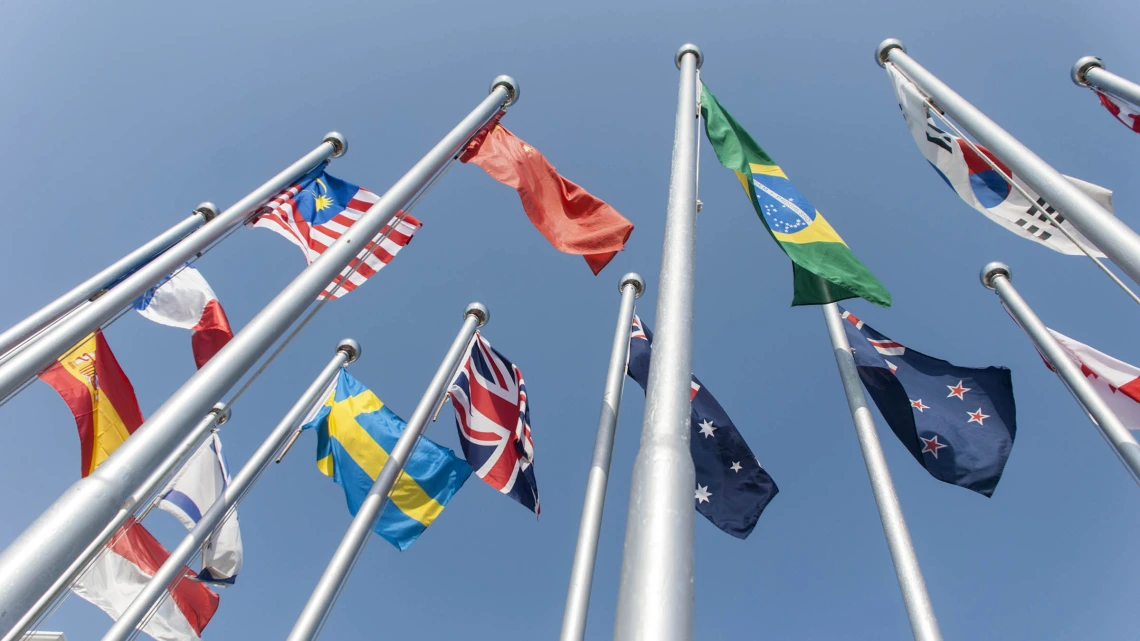
The Global Health Equity Scholars will conduct a year-long research training program in countries including Jamaica, Nigeria, Ethiopia, India and Peru.
The Global Health Equity Scholars (GHES) fellowship program, a year-long research training program funded by the National Institutes of Health (NIH) Fogarty International Center, sends a new cohort of students to conduct research in low-and-middle-income countries (LMIC) around the world every year. This year, six students connected to the Mel and Enid Zuckerman College of Public Health at the University of Arizona Health Sciences were awarded fellowships to pursue global health research.
Notably, all six of the GHES fellows with a UArizona Health Sciences connection are being mentored by Purnima Madhivanan, MBBS, MPH, PhD, associate professor of health promotion sciences at the college. Dr. Madhivanan recently received an Outstanding Mentorship Award from the University of Arizona in recognition of her unique ability to guide and inspire students.
“Public health is a global challenge, and I’m so proud of our global health fellows as they lead the way to improve health outcomes in underserved communities,” said Iman Hakim, MD, PhD, dean of the college. “We are so fortunate to have Dr. Madhivanan, with all her knowledge and experience, as a mentor for our fellows. She is guiding the next generation to become public health leaders with a global vision.”
Shakeyrah Elmore, MS
Shakeyrah Elmore, MS, PhD candidate, will spend her Fulbright-Fogarty fellowship year with the University of the West Indies, Carribean Institute for Health Research in Kingston, Jamaica under the co-mentorship of Susan Walker, PhD, and Dr. Madhivanan, along with Marshall Tulloch-Reid at the University of West Indies.
During her fellowship year, Elmore will employ qualitative research methods to explore the lived experiences of postpartum depression among Jamaican women. Elmore said she feels honored by the fellowship opportunity, and excited to conduct research that will address global health disparities and health equity.
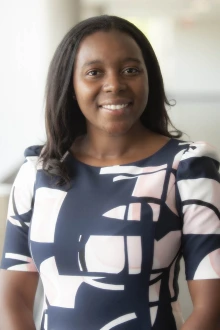
Shakeyrah Elmore, MS
Elmore received both her MS and BS degrees from the University of Cincinnati, and now is a PhD candidate at University of Louisville, Department of Health Promotion and Behavioral Sciences.
“I believe that health is a human right, and everyone deserves an equal chance to lead a healthy life. The unfortunate reality is that this is not the case,” Elmore said. “I want to be a part of changing this narrative, and impacting the health of those marginalized groups, particularly populations across the African diaspora, women and children.”
Elmore had several life experiences and challenges that led her to pursue a career in public health. “I share the altruism that brings many to the field,” she said. “Additionally, my spiritual background is something that I pride myself on because it is the driving force behind my passion to do this work, to know that God gave me specialized spiritual gifts to take into the world and spread light, to be a part of changing inequities that exist.”
Magdiel Habila, MPH
Magdiel Habila, MPH, PhD candidate, will spend her Global Health Equity Scholars fellowship year at Jos University in Nigeria studying the barriers and implementation issues to cervical cancer screening uptake in Jos and the surrounding communities from patient and provider perspectives. She will work under the co-mentorship of Jonah Musa, MBBS, PhD, in Nigeria, and Dr. Madhivanan.
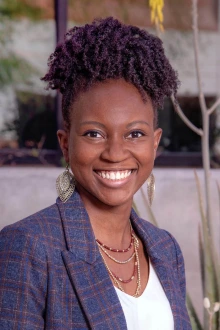
Magdiel Habila, MPH
A doctoral candidate in epidemiology at the College of Public Health, Habila is also currently working toward a master of science in health and pharmaceutical outcomes in the College of Pharmacy. She earned her BS in psychology from Pacific Lutheran University and completed her MPH from the College of Public Health in 2019. She is a graduate research associate with Elizabeth Jacobs, PhD, professor of epidemiology and biostatistics, as part of the CoVHORT Genome Wide Association Study.
“This fellowship is an opportunity for me to learn from and work with researchers in my home country, to identify and address the barriers to health equity that Nigerian women face,” said Habila. “All with the goal of making sustainable changes that will lead to improved health. This is an incredible opportunity to grow as a researcher and to give back to my community.”
Her goal is to become a cancer epidemiologist who focuses on understanding and addressing barriers to health equity in cancer diagnosis and treatment among women living in sub-Saharan Africa. “I decided to focus my research on cervical cancer because it is inexcusable to me that women in Nigeria and around the world die of a disease that is completely preventable simply because they lack access to preventative healthcare services,” said Habila. “And I want to thank my mentors, Dr. Jacobs, Dr. Madhivanan and Dr. Musa whose guidance and insight has been instrumental in designing my research project.”
Breanne Lott, PhD
Breanne Lott, PhD, MPH, will spend her Global Health Equity Scholars fellowship year in Ethiopia with Addis Ababa University, under the co-mentorship of Dawit Worku Kassa, MD, in Ethiopia and Dr. Madhivanan.
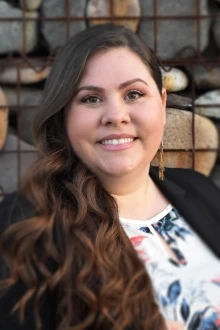
Breanne Lott, PhD
In Ethiopia, Dr. Lott will study community-based cervical cancer screening approaches such as home-based HPV self-sampling. After evaluating the screening preferences of women living with and without HIV, she will pilot an intervention to increase screening uptake. Dr. Lott said she is excited about the opportunity to reduce the global impact of cervical cancer through improved screening programs.
Dr. Lott graduated from the College of Public Health with a PhD in health behavior health promotion in May 2021. She started her educational journey at Arizona State University with a bachelor of arts in global health, then received a master’s of public health from the College of Public Health program in Phoenix. Dr. Lott completed her dissertation on cervical cancer screening and prevention in Ethiopia, which began her passion for global health scholarship and served as a foundation for her GHES application.
“I really look forward to connecting with other global health researchers,” said Dr. Lott. “We have already had the opportunity to network with other fellows from around the world. I hope to acquire new skills through this fellowship and learn more about the variety of career paths.” Dr. Lott said she has a passion for improving lives by using public health practices. “I am excited about women’s health and hope to contribute to this field by reducing global cancer burden through improved cervical cancer screening programs.”
Arathi Rao, MD, MPH, PhD
Arathi Rao, MD, PhD, MPH, will spend her fellowship year in Udupi, India to research the lived experience of women who face the double burden of COVID-19 and cardiac disease using a mixed-method approach. She will be co-mentored by Judith Noronha, PhD, MSc, MPhil, in India and Dr. Madhivanan.
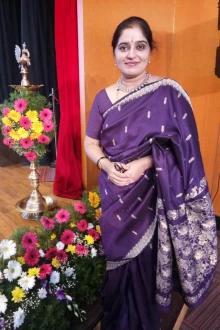
Arathi Rao, MD, MPH, PhD
Currently serving as associate professor and coordinator of the MPH program at Prasanna School of Public Health at Manipal Academy of Higher Education (MAHE) in India, Dr. Rao is working toward a postdoctoral fellowship at the College of Public Health. Previously she was a practicing gynecologist, valuable experience that informs her ongoing interest in women's health.
“Women’s voices are unheard in patriarchal societies irrespective of literacy, employment and social status,” said Dr. Rao. “I want to change that. I give regular talks on community radio about public health issues, with a special focus on maternal and child health. I was a practicing gynecologist and I chose a different path, to earn my MPH degree. The MPH completely transformed my perspective towards health as a clinician.”
Dr. Rao is passionate about giving back to society and improving the lives of women in LMICs through qualitative research. Her career goal is to find social, context-based solutions to women's health issues in conservative patriarchal societies, both in India and across the globe.
Tina Samsamshariat, MPH
Tina Samsamshariat, MPH, will spend her GHES fellowship year in Lima, Peru at Universidad Peruana Cayetano Heredia (UPCH) under the co-mentorship of Magaly Blas, MD, MPH, PhD and Dr. Madhivanan.
Through her research, Samsamshariat aims to understand the resilience and adaptation strategies of community health workers delivering maternal and neonatal care during the COVID-19 pandemic in Loreto, Peru. She will look at how the pandemic has affected external factors, such as limited resources, and transportation, as well as the impact on mental health.
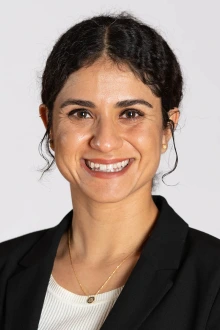
Tina Samsamshariat, MPH
During this research project she will utilize a community based participatory research strategy called Photovoice, a visual research methodology with the intention to foster social change by providing cameras to community health workers to photodocument their personal experiences. Photovoice projects seek to empower participants and communities. “My project allows me to bring together public health, art/photography, policy, and health equity, which are all topics I am passionate about,” she said.
Now in her fourth year at the UArizona College of Medicine – Phoenix, Samsamshariat brings a passion for emergency medicine, disaster relief, women’s health and policy to her fellowship. She earned her BS from University of California Los Angeles (UCLA) and MPH from the University of Southern California (USC). Her current focus is to develop complex healthcare systems at multilateral and community levels to better address changes in our built, sociopolitical and natural environments. Looking forward to her career in global health, Samsamshariat said she envisions herself in a leadership role with a non-governmental organization (NGO) like Doctors without Borders or Partners in Health, or even starting her own organization that tackles modern issues in public health.
“I’m looking forward to making partnerships with community leaders and better understanding how COVID-19 is affecting populations around the world,” said Samsamshariat. “Many of our health victories over the past century have been public health victories, like washing our hands and vaccines. We have a tendency to look to technology as solving our problems, but simple public health solutions can have incredible impact on the health of populations.” She said she believes that understanding how health equity, access to healthcare, and other socioeconomic factors impact people’s health will make her a better doctor.
Lisa Woodson, MPH
Lisa Woodson, MPH, will be spend her Fulbright-Fogarty fellowship year in Peru where she will conduct research among an indigenous population within the Amazon basin under the co-mentorship of Drs. Blas and Madhivanan.
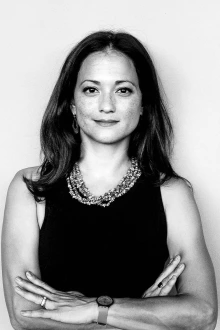
Lisa Woodson, MPH
Woodson’s research focuses on perceptions of health seeking behaviors and changes to those behaviors as a result of the COVID-19 pandemic and its economic consequences, as experienced by indigenous Amazonian peoples. She will quantify changes to health seeking behaviors by measuring health care access, childhood vaccine coverage, and prenatal/postnatal care. Woodson said she is inspired to conduct this research under the guidance of Drs. Madhivanan and Blas and added, “It is not every day that you get to work with your role models!”
A second year PhD student in epidemiology with a minor in global health at the College of Public Health, Woodson earned her BS in general biology with minors in chemistry and creative writing, and her MPH in international maternal and child health at UArizona.
After Woodson received her BS degree, she became a Peace Corps volunteer in Nepal. “In Nepal, I began to understand the true struggles people faced day-to-day,” she said. “I saw how inadequate sanitation facilities played a role in student attendance at school, especially among girls. How in certain times, the school population dwindled to less than half because of the need for child labor, illness, and the ongoing civil war.” She took this knowledge back to Arizona to pursue her passion for global health, and her MPH degree enabled her to work both globally and locally in public health, enhancing her education. “Many public health problems faced today are multi-layered and often result from health inequalities and structural factors. I am interested in understanding this intersection so that I can work towards meaningful improvements to health outcomes for the most vulnerable populations,” said Woodson.
A version of this story was originally published by the Mel and Enid Zuckerman College of Public Health.

